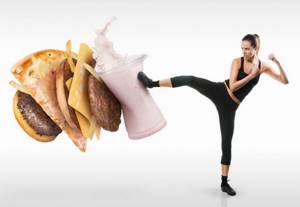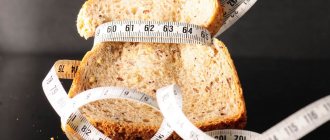How much weight can you really lose in a month?
Excess weight makes it easier to lose weight. The more a person weighs, the easier it is to lose excess weight. The hardest thing to get rid of are the last few kilograms, or rather two to five. The main thing is to lose weight correctly. You can't stick to a strict diet. Otherwise, health problems cannot be avoided.
Don't neglect training. Some calories are lost during exercise. Thanks to various variations of weight loss, including those based on proper nutrition without physical activity, as well as using training, gym classes, jogging and more.
How much can you lose without exercise and on proper nutrition in a month?
Losing weight involves the body first losing excess fluid. The two to five kilograms that are lost in the first week are not excess fat, but water. Fat reserves begin to disappear only from the second week. How much will be lost depends entirely on individual characteristics. What matters is nutrition, activity, whether there is a predisposition to obesity, hormonal levels, and health.
The exact indicators depend entirely on the individual. To maintain health and maintain weight, it is not recommended to lose more than 1-1.5 kilograms per week, which is about 200 grams per day. Strict restrictions allow you to lose much more mass. However, it will return as the body begins to store fat to have an energy reserve in case of starvation.
On a vegetarian diet
It has some restrictions that must be observed:
- Absolutely any meat is prohibited, that is, from killed animals and birds;
- Strict veganism requires the exclusion of dairy products, fish, and eggs from the diet.
Such a diet provokes a deficiency of animal protein. Its deficiency leads to a significant decrease in muscle mass. Consequently, weight is lost not only due to fat deposits. A certain proportion of kilograms are lost due to muscles. The result of this can be dystrophy.
Digestion of animal fat and protein contained in meat forces the body to spend approximately four hours on digestive processes. If you stop eating meat products, your own reserves of protein and fat will begin to be used up faster. A person will begin to lose from 2 to 3 kilograms per week, but muscle fibers will begin to disappear along with them. By eating this way, you can lose up to 15 kilograms in a month, but still look unhealthy.
Adhering to a vegetarian diet is recommended for people with blood type II. This is due to the characteristics of the body, which better assimilates plant rather than animal food. For other people, such nutrition is not balanced, that is, it is contraindicated.
On a protein diet
It is considered most effective in the fight against extra pounds. Eating protein foods for a long time is not recommended. Excess of nutrients leads to disruption of the excretory organs. The monotony and imbalance of the diet provokes the fact that the body is constantly under stress and becomes vulnerable, which means that the lost kilograms can return again. Therefore, it is permissible to adhere to such a diet only for a short period of time.
By eliminating carbohydrates from the diet, weight loss occurs mainly due to the loss of energy reserves, that is, fat deposits. Muscle mass remains virtually intact by reducing portions, frequent meals, and getting large amounts of protein. The first week of a protein diet allows you to lose almost 7 kilograms if the excess weight is 20 kilograms or more. Then the excess weight will begin to fall much more slowly. The rate of weight loss will be from 200 to 250 grams per day.
Combining proper nutrition and exercise
Physical activity provokes additional burning of calories (both incoming and stored as fat deposits). Performing cardio training allows you to lose about 800 kcal per hour, which makes a significant contribution to the fight against excess body weight. Each gram of fat contains about 9 calories, which means that within a sixty-minute workout, about 90 grams of fat are lost, if you don’t also take into account the fluid that comes out with sweat.
To achieve maximum effect, adherence to the following rules:
- compiling a diet predominantly from protein foods;
- minimizing foods high in carbohydrates, especially fast ones, which include baked goods and confectionery;
- consumption of simple and complex carbohydrates only in the morning;
- compliance with the drinking regime;
- training three to four times a week;
If you run every day for 30 minutes
In half an hour of running, about 400 kcal are burned, but only if the load is correct. It assumes that the pulse must be rapid, that is, at least 120 beats per minute. If you calculate the amount of fat burned, it will be approximately 45 grams. It is important to remember here that energy from the fat depot begins to be consumed only 20 minutes after the start of jogging. The exception is running on an empty stomach. If you exercise after eating, only the calories you eat will be burned.
Exercise and weight loss
Complex workouts make no sense without a balanced diet and when you overeat. People who consume from 3000 to 4000 kcal per day, even while intensely exercising, can gain weight and not always muscle mass. This is due to a violation of the basic principle of losing weight, which is that the number of calories consumed should be less than those expended.
What if you don't eat after six in the evening?
This principle of nutrition works only in cases where you go to bed no later than 22.00. Fasting for four hours and then for another whole night sends a signal to the body that it needs to accumulate energy. Low-fat fermented milk products drunk before bed will not do any harm. Kefir, for example, perfectly satisfies hunger, does not contain carbohydrates, and therefore is not stored as fat.
No more than 1000 kcal per day
Proper nutrition, which allows you to lose weight and not plunge the body into a state of storing energy in reserve, requires maintaining a daily caloric intake of 1200 calories. If you eat no more than 1000 kilocalories, this will have negative consequences. Eating at this pace, a person sooner or later breaks down, and any excess immediately begins to be deposited in fat, and if you return to your usual diet, even more intensely.
1200 calories per day
Reducing the energy value of food is the surest way to lose weight. It all depends on the source of calories. If 1200 kcal comes from confectionery, you won’t be able to lose weight. The kilograms will begin to fall off if a balance is maintained between carbohydrates, fats, and proteins, that is, in a ratio of 30% to 20% to 50%. Sugar is definitely prohibited. If you eat a balanced diet, you can lose 4-6 kilograms every month.
How many kg can you lose in a month?
You can lose weight (kilograms) not only due to fat, but also:
- precious muscles (which are important because they are what make up the beauty of the body)
- water
And in reality, by losing all this together you can really quickly reach the desired number on the scales.
But! Question - what is the use of the desired arrow on the scales? I don’t know, 40 kg or how much do you need there?))

Do you think this necessary number on the scales is what makes up the beauty of your bodily forms?
Who, excuse my French, gives a crap about knowing how much you weigh, what your weight is, what the arrow is on the scale that only you look at? We all don’t care – take off your rose-colored glasses.
A person's appearance is assessed visually in real life by looking at oneself in the mirror, looking at the person.
Here are examples of people who are stupidly losing weight and for whom the right arrow on the scale is important:

Such girls/women and men (if any) do not value their muscle tissue.
This is why, in principle, losing weight anyhow, in my opinion, is not the right strategy... the right strategy (in my opinion) is to lose (burn) mainly fat, which is the culprit of all troubles.
And try to preserve muscles (muscle tissue) as much as possible. This is the approach I recommend to everyone!
Conclusion: Not leather! Not fat! Not bones! Unnecessary arrow on the scale! Namely, the presence of muscle tissue on the body (the presence of muscles) with a low percentage of fat manifests visual beauty.
What affects the rate of fat burning
Everyone loses fat differently, which is due to three factors:
- Food. Fat deposits disappear faster if you consume a minimum of fats and carbohydrates.
- By training. Thanks to physical activity, extra calories are burned.
- Metabolism. A slow metabolic rate means that fat is burned slowly or not at all. Exercise and proper nutrition can increase your metabolism.
If you follow these three rules, the fat will begin to disappear effectively.
Weight Loss Standards
To lose weight without health consequences, you need to lose no more than one kilogram weekly. This allows you to maintain your metabolic rate, not harm internal organs, not lose skin elasticity, and also save energy to fight excess weight. If you follow this rule, the result will be maintained for a long time.
The main thing is to avoid the following mistakes:
- Starve. If caloric intake falls below the permissible norm, the body begins to accumulate fat at an even greater rate, which means that metabolism slows down.
- Avoid fats. Only trans fats are harmful, while unsaturated fats are healthy and necessary. Free fats, combining with molecules of unrefined oils, are removed from the body and speed up this process.
- Avoid salt. Adding flavor to food, if the water-salt balance is disturbed, it is capable of retaining excess liquid. Salt does not affect weight loss, but in order to preserve bone structure and prevent cramps, it must be present in at least 2 grams per day.
When people try to lose weight quickly

When people try to lose weight quickly = they, as a rule, arrange sharp and large restrictions for themselves, as a result of which very strong (powerful) stress occurs for our body (body), which begins to think that it is in extreme conditions and starvation is soon possible.
Therefore, our body (body) goes into an economical operating mode.
The body immediately begins to help you, your survival, so that you do not die (la).
How he does it? => bingo! slows down all metabolic reactions in the body, all so that your fat reserves last for a longer time (in other words, it helps you survive).
How to count calories?
It is best to keep track of the amount of calories you are losing using a special food diary. Using tables of dietary fat and calorie content of foods makes it easier to track your daily calorie intake. The main thing is to take into account the exact mass of the portion.
Eating about 22-26 kcal per kilogram of your own weight helps you lose weight and stay healthy. Multiplying your weight by the norm allows you to calculate your daily calorie intake, taking into account the fact that the amount of protein per 1 kilogram of weight should be 2-3, the same amount of carbohydrates, and fat 1-2 grams. To calculate how much this is in calories, you can take into account the fact that for every gram of protein there are 4, carbohydrates - 4, and fat - 9 kilocalories.
How to lose weight correctly?
Losing weight requires compliance with several important rules that must be followed in order to maintain the achieved result and not harm your own health.
Proper and dietary nutrition
Any diet gives only a temporary effect. Only a complete revision of your diet allows you to stay in shape. This presupposes the absence of too strict restrictions so that there is no desire to break.
The following rules must be observed:
- eat small meals every three hours;
- be sure to have breakfast, since the calories incoming in this meal are the most important;
- snack on vegetables, dried fruits, dairy products, fruits, nuts;
- never overeat;
- do not undereat at night;
- do not eat carbohydrates in the evenings, with the exception of fiber-rich vegetables.
Physical activity
Fat burning workouts help you lose even more weight. The main thing is to choose the right program and loads. A professional trainer can help you create it. If you exercise on your own, you should run, ride a bike, do endurance exercises, and use cardio equipment. The duration of training should be from 40 to 60 minutes, and the pulse should be 120-160 beats per minute.
You should start practicing with a warm-up. Fast walking allows you to warm up your muscle ligaments. To avoid getting tired, you need to run at intervals. Five minutes of running and two minutes of walking. If jogging is done daily, then you need to exercise for at least half an hour. Hour-long workouts will bring results if you run at least three to four times a week.
You can't run on a full stomach. You should wait at least an hour after eating. It is forbidden to eat up your fatigue with fatty and sweet foods. It is better to drink water, and you should eat only 30 minutes after your run.
Expert advice
Nutritionists will never advise anyone to follow a mono-diet based on one or two products. Experts recommend not restricting calories too sharply. Otherwise, stress will lead to breakdown and uncontrolled overeating. You don't have to give up all your favorite foods. Once a week you can indulge in a salad dressed with mayonnaise, low-fat sour cream or kefir.
Professional fitness trainers note that many people, wanting to lose weight, train for two or three hours and then also fast. This does not allow you to speed up weight loss. Prolonged physical activity only leads to fatigue. A tired body does not release the energy accumulated in the fat depot, since it needs it for “survival”. Fasting leads to a decrease in metabolic rate.
Trainers advise moderate physical activity and good nutrition after exercise. Food eaten during this period of time, on the contrary, is quickly absorbed, restores the body, relieves fatigue, which makes the process of fat accumulation unnecessary.
Slimming intensity

When playing sports
Exercise alone may not be enough to achieve great results.
The body can adapt to stress and with light physical activity, energy is not spent as much as it seems. Therefore, for better results, you should combine a healthy diet with a healthy lifestyle.
With proper nutrition
It is not recommended to immediately limit your diet.
It makes more sense to gradually reduce with the removal of unhealthy foods from the diet:
- You can start by removing smoked foods , chips, sweet soda, sweets of all types, canned food, etc.
- Limit or eliminate alcoholic drinks , which are very high in calories.
- Switch to dietary meats.
- Use bran or rye bread instead of wheat.
- Introduce real cereals into your diet, not sweet instant ones.
- Optimize the daily menu to 1400 or a maximum of 1800 kilocalories per day.
- Periodically arrange fasting days for yourself , if there are no contraindications to this.
This is proper nutrition, which can be called the most harmless, but, alas, also the slowest way to lose weight.
In a month, with this approach, you can achieve a loss of 2 or 4 kilograms. This means that with appropriate willpower, in about a year, any obese person will be able to achieve visible results. And if you connect sports to this, the result will become even better.
With a combination of proper nutrition and exercise

- Here it is recommended to simultaneously avoid eating after 6 pm. Or, if you are used to staying up until midnight, then don't eat after 9 pm.
- Fitness or any other sport are your faithful allies.
- Don’t indulge in junk food and goodies. Sport itself is not a panacea if you continue to stuff your body with extra and unnecessary calories.
With an integrated approach in terms of nutrition and physical activity, weight loss can reach 7 kilograms, but this comes down to individual characteristics.
Examples of sports loads:
- With regular intensive exercise in the gym 3 times every 7 days , you can reduce weight up to 5 kg in a month with proper nutrition.
- Water aerobics is one of the effective ways to lose five kilograms in 1 month. In this case, it will be advisable not only to eat, but also to visit the sports complex every two days.
- Exercise bike. This option is suitable for those who intend to improve their physical shape without leaving home. Regular approaches 4 times a week for 30–40 minutes can help you lose up to 10 kilograms of excess weight.
For your information:
- The intensity of any type of training should tend to increase,
- Strength exercises often bring less results than cardio exercises (running, sports dancing, volleyball, badminton, etc.).
When switching to pure vegetarianism
This is a whole complex that includes not only a diet without meat, but also a conscious philosophical system of attitude towards the world around us.
Switching to vegetarianism just for the sake of losing weight may not have any results. Since bakery products, sweet desserts, etc. are not prohibited.
When switching to a protein diet
Reducing carbohydrates and leaning on proteins can lead to weight loss of 5 to 15 kilograms.
But there are some disadvantages here - the load on the organs increases, the kidneys, liver, heart and blood vessels may suffer.










